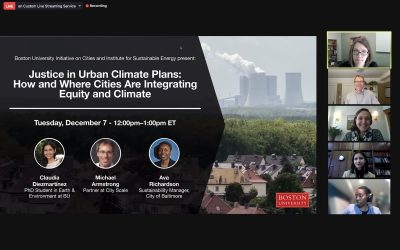Boston University’s Initiative on Cities and Institute for Sustainable Energy held a Zoom event titled “Justice in Urban Climate Plans: How and Where Cities Are Integrating Equity and Climate” Tuesday with experts from around the country.

To begin the webinar, panelist Claudia Diezmartínez Peregrina, a second-year doctoral student in BU’s Department of Earth and Environment, presented her research on urban climate action plans throughout the United States. She said her research analyzed the 100 largest cities in the United States and if and how they have added justice in their climate action plans.
“For each of these plans, we conducted content analysis and identified the ways in which cities articulate justice with respect to climate mitigation,” Diezmartínez Peregrina said at the event. “This analysis revealed that climate action plans in the U.S. are increasingly incorporating justice, but attention to policy implementation and evaluation is lacking.”
While the mention of justice is increasing, out of the 100 cities — 58 of which had an eligible plan to evaluate — she said 40 of them included the term. Only 12 had “tools to implement and evaluate just climate policies.”
“I didn’t expect that so many cities would have justice concerns incorporated into their plans already,” she said in an interview before the event. “We weren’t as optimistic as having 40 out of 58 cities that we included in our sample to actually be thinking about justice.”
After Diezmartínez Peregina’s presentation, the rest of the panelists had the opportunity to answer questions from the audience and the moderator. Questions ranged from topics about what climate plans look like currently in different cities, the changing field of climate planning and current successful climate action and justice plans.
Ava Richardson, panelist and sustainability manager in the City of Baltimore, talked about the climate action plan in place in Baltimore. She described their 2019 plan as very “technical.”
“It’s focused on very quantitative measures, but we know that when it comes to pursuing equity in that process, it really means that we have to stick to our equity implementation guidelines,” Richardson said.
She said Baltimore is “really thinking critically about how we’re operationalizing equity, how we’re thinking through budget allocations as it relates to ensuring that they are equitable.”
Those guidelines also prioritize avoiding displacement of marginalized communities, she said.
“We are very intentional about moving forward in a way that advances participatory governance,” Richardson said. “We’ve been really dedicated and diligent about always engaging literally thousands of residents across the city when it comes to how we push for policies.”
Michael Armstrong, a panelist and former sustainability manager in Portland, Oregon, is currently a partner at City Scale. He explained how climate planning is something that has evolved and changed over the years.
“Climate is amazing in what a sprawling issue it is, it touches so many segments and so many of them share root causes and issues with issues of justice,” Armstrong said. “Climate and justice together are really incredibly powerful organizing intersection of all these different social issues, economic issues, that really are about quality of life.”
Diezmartínez Peregrina talked about the current successful climate plans. She said looking at these can help with what details to include to improve climate action planning and how a lot of cities are bringing justice and climate together.
“They’re considering climate action and climate justice no longer as two separate things or seeing justice just as this additional cherry on top for the climate plan, but actually thinking about climate justice is climate action,” she said.
The event ended with panelists making final statements about how to keep up the momentum of climate action and justice plans, said Anne Short Gianotti, associate professor in the department of earth and environment and event moderator. Panelists emphasized the importance of having hope, working together and ensuring the inclusion of all to build these plans.
“The impacts of climate change are disproportionately affecting the most vulnerable populations,” Short Gianotti said in an interview. “By bringing a justice and equity lens into climate policies, we create the possibility for addressing historic inequalities and avoiding future inequalities.”



























































































































Gabriel • Dec 11, 2021 at 1:38 pm
an example of research with an open mind replacing preconceived ignorant opinions. consider research to understand how modern ranch and farm processes have changed climates.